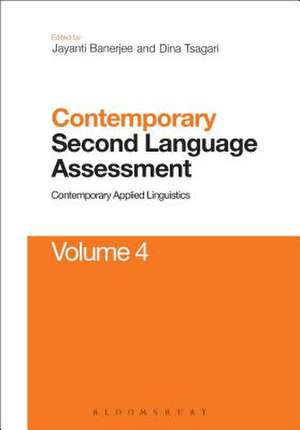Contemporary Second Language Assessment: Contemporary Applied Linguistics Volume 4: Contemporary Applied Linguistics
Editat de Jayanti Veronique Banerjee, Dina Tsagarien Limba Engleză Paperback – 6 feb 2019
Preț: 261.38 lei
Preț vechi: 298.24 lei
-12% Nou
Puncte Express: 392
Preț estimativ în valută:
50.02€ • 52.35$ • 41.63£
50.02€ • 52.35$ • 41.63£
Carte disponibilă
Livrare economică 10-24 martie
Preluare comenzi: 021 569.72.76
Specificații
ISBN-13: 9781350096943
ISBN-10: 1350096946
Pagini: 328
Dimensiuni: 169 x 244 x 21 mm
Greutate: 0.55 kg
Editura: Bloomsbury Publishing
Colecția Bloomsbury Academic
Seria Contemporary Applied Linguistics
Locul publicării:London, United Kingdom
ISBN-10: 1350096946
Pagini: 328
Dimensiuni: 169 x 244 x 21 mm
Greutate: 0.55 kg
Editura: Bloomsbury Publishing
Colecția Bloomsbury Academic
Seria Contemporary Applied Linguistics
Locul publicării:London, United Kingdom
Caracteristici
Examination of the increasingly important social and political context of language assessment
Notă biografică
Dina Tsagari is Assistant Professor in Applied Linguistics/TEFL in the Department of English Studies at the University of Cyprus, Cyprus. Jayanti Veronique Banerjee is Research Director at Cambridge Michigan Language Assessments, USA.
Cuprins
Introduction, Dina Tsagari (University of Cyprus, Cyprus) and Jayanti Banerjee (Cambridge Michigan Language Assessments, USA) Section I: Key Theoretical Considerations 1. Modelling Communicative Language Ability: Skills and Contexts of Language Use, Lin Gu (Educational Testing Service, USA)2. Presenting Validity Evidence: The Case of GESE, Elaine Boyd and Cathy Taylor (Trinity College London, UK)3. A New National Exam: A Case of Washback, Doris Frötscher (Federal Ministry of Education, Austria)4. Linking to the CEFR: Validation Using a Priori and a Posteriori Evidence, John de Jong (Pearson Engish, The Netherlands) and Ying Zheng (University of Southampton, UK)Section II: Assessment of Specific Language Aspects 5. Authentic Texts in the Assessment of L2 Listening Ability, Elvis Wagner (Temple University, USA)6. The Role of Background Factors in the Diagnosis of SFL Reading Ability, Ari Huhta (University of Jyväskylä, Finland), J. Charles Alderson (Lancaster University, UK), Lea Nieminen (University of Jyväskylä, Finland), and Riikka Ullakonoja (University of Jyväskylä, Finland)7. Understanding Oral Proficiency Task Difficulty: An Activity Theory Perspective, Zhengdong Gan (The Education University of Hong Kong, Hong Kong)8. Principled Rubric Adoption and Adaptation: One Multi-method Case Study, Valerie Meier (UC Santa Barbara, USA), Jonathan Trace (University of Hawai'i at Manoa, USA) and Gerriet Janssen (Universidad de los Andes, Columbia)9. The Social Dimension of Language Assessment: Assessing Pragmatics, Carsten Roever (University of Melbourne, Australia)Section III: Issues in Second Language Assessment 10. Applications of Corpus Linguistics in Language Assessment, Sarah Cushing Weigle (Georgia State University, USA) and Sarah Goodwin (Michigan State University, USA)11. Setting Language Standards for International Medical Graduates, Vivien Berry (British Council, UK) and Barry O'Sullivan (British Council, UK) 12. Fairness and Bias in Language Assessment, Norman Verhelst (European Association for Language Testing and Assessment, The Netherlands), Jayanti Banerjee (Cambridge Michigan Language Assessments, USA) and Patrick McLain (Cambridge Michigan Language Assessments, USA)13. ACCESS for ELLs: Access to the Curriculum, Jennifer Norton (Center for Applied Linguistics, USA) and Carsten Wilmes (University of Wisconsin-Madison, USA)14. Using Technology in Language Assessment, Haiying Li, Keith T. Shubeck, and Arthur C. Graesser (University of Memphis, USA) 15. Future Prospects and Challenges in Language Assessments, Sauli Takala (University of Jyväskylä, Finland), Gudrun Erickson (University of Gothenburg, Sweden), Neus Figueras (Generalitat de Catalunya, Spain), and Jan-Eric Gustafsson (University of Gothenburg, Sweden)Index
Recenzii
This edited book offers a panoramic view of current thinking in second language assessment. The fifteen substantive chapters cover conceptual and operational challenges in assessment design and test development. Assessment professionals, researchers and students alike will find the up-to-the-minute discussions in this volume highly informative.
Certainly gives the reader a taste of a wide variety of language testing research projects ... Each of the individual chapters would offer useful insights to researchers engaged in similar projects and would offer interesting material for discussion on graduate courses in language assessment.
Certainly gives the reader a taste of a wide variety of language testing research projects ... Each of the individual chapters would offer useful insights to researchers engaged in similar projects and would offer interesting material for discussion on graduate courses in language assessment.


